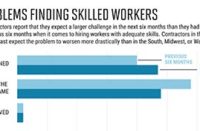Choosing the right manufacturer is a dilemma every contractor in our industry faces every day. Before I delve into this topic, let me share a few of my thoughts. I’ve heard many analogies used to describe the decorative concrete industry over the years, but two comparisons have always resonated the most: “Polished Concrete is part Art and part Construction,” and “The polishing industry is still the Wild West.”
To me, both of these descriptions are correct. Installing any version of decorative concrete is part art, part construction. The project slab is like a canvas. Sometimes the canvas is beautiful, like most new construction projects, and sometimes the canvas is rough, like many remodeling projects. No matter the canvas, the decorative concrete contractor is tasked with turning it into a piece of art. And this transformation must take place in a construction environment.
The construction environment is like a battlefield every contractor must maneuver on almost every project. You fight debris that gets into your work, navigate damage made by other trades during and after the installation process, and face a multitude of difficulties that can slow you down, necessitate repair work or sometimes destroy your artistic efforts.
In this tumultuous environment, manufacturers or suppliers act as assistants, developers and even lifelines for the project’s contractors. In my role as a consultant, I have the privilege to watch the interactions between a host of contractors, subcontractors and manufacturers on many different projects. I believe sharing some of this insight may assist contractors to more efficiently choose manufacturers.
Bank on consistency
There are several factors to consider when choosing a manufacturer to help your company be more successful. Consistency is at the top of this list.
Because I travel a lot and am constantly on the go, I often rely on quick meals, aka fast food. Although I really don’t like McDonald’s all that much, I’ve found the food you get from the Golden Arches is consistent all around the world. I go there because I know what I’m getting and can plan appropriately. The same philosophy should be attributable to your selection of manufacturers.
If you get different quality or results across multiple purchases from a manufacturer, more than likely it is caused by a lack of quality control. You may not have the absolute best sealer or diamond tooling on the market, but if you have consistency, then successful, profitable projects and happy customers will follow. Do not be afraid to ask your manufacturers what tolerances and safeguards are built in on any products sold. A good manufacturer will know these answers immediately.
Build strong relationships
When it comes to choosing manufacturers, the second quality to look for is strength of relationship. We are all human. Personal connections are extremely important and are hardwired into our human nature. If a contractor and manufacturer have a great relationship, both sides benefit. Having a specific person who knows you and your business that you can call directly at your manufacturer is a fantastic resource.
As a contractor, there were many times I had to call manufacturers and ask favors on product delivery, information or technical assistance. If the relationships had not been there, the issues would not have been resolved in a timely manner, which would have led to significantly more expenses for me.
My recommendation for the second-most important attribute is to develop strong relationships. The relationship drives your customer service experience better than any other factor.
Consider price last
The third-most important attribute — and I stress ‘third’ — to consider is price. As a contractor, I was always concerned about price, but I quickly figured out good service and product consistency saved me more money over time in reduced labor costs and customer satisfaction. As long as your selected manufacturers are somewhat competitive in the market, the first two attributes are much more important than initially saving a few bucks on the price of chemicals or tooling.
I regularly watch contractors make final decisions on their consumables based on price alone. Many of them end up with extra costs to repair the installation of poor quality products or the use of substandard tooling. I am managing several projects in this situation right now.
Explore the Wild West
At the beginning of this article, I noted that overall the decorative concrete market is like the Wild West. What I meant was that lots of territory is still wide open. Over the years, I’ve watched a steady stream of new manufacturers compete over the same market segments such as machines or chemicals. Consolidation takes place regularly among the manufacturing players, and sometimes there are major splits and fights behind the scenes. All of this can be pretty scary if you’re a contractor trying to get jobs completed, keep guys employed and make a little profit along the way.
With this in mind, I recommend you have at least two good relationships with manufacturers of each of your supply items. It is OK to use more of one than the other based on the factors described earlier, but have a backup plan.
Regularly use your secondary source for a portion of your work. This will allow an additional side benefit of testing products from at least two manufacturers, which will steadily increase your knowledge as well as your productivity. If one manufacturer has a major issue that affects your supply, you can always go to your secondary source without sacrificing the quality of your work or impacting your project schedules.
Choose wisely
The descriptions and recommendations covered in this article are based on my personal experiences and the information gathered from working on a variety of projects with multiple contractors. As an independent consultant, I watch interactions without recommending one manufacturer over another for equal products.
I hope these thoughts help you choose your manufacturers wisely. You will be surprised how much easier your work will be with the right support.















